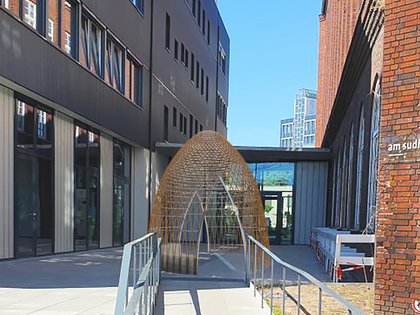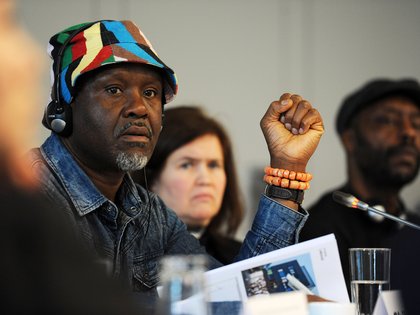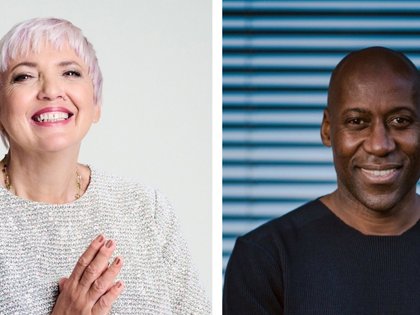The people behind the winning design: The Lockward Collective
The Lockward Collective is the winner of the art competition for a Decolonial Memorial! Artists Jeannette Ehlers and patricia kaersenhout in collaboration with advisor Rolando Vázquez will realize the winning design “EarthNest”. Architect Max Bentler is the technical advisor.
But who are the people behind the winning design?
An Interview by Michaela Zischek
Michaela: Welcome to Berlin Global Village! Congratulations on winning the international art competition out of 244 submitted designs! Let’s get to know you a little bit. First, let’s hear from you Jeannette. Could you introduce yourself?
Jeannette: Thank you, Michaela. We are so honored. I am Jeannette Ehlers, a Copenhagen-based artist of Danish and Trinidadian descent. My practice spans across photography, video, installation, sculpture, and performance. I graduated from The Royal Danish Academy of Fine Arts in 2006 and I was Chair of The Danish Arts Foundation Grant Committee for the Visual Arts from 2020-2023. My work, including the public sculpture project I Am Queen Mary, often addresses decolonial themes and has been recognized internationally.
Michaela: Please tell us more about what discussions and topics your work typically engages with.
Jeannette: My work confronts decolonial hauntings and disruptions, emphasizing empowerment and healing through art, particularly honoring the legacies of resistance in the African diaspora. As author Lesley-Ann Brown notes, my work reminds viewers that "history is not in the past."
Michaela: How does colonialism concern you personally?
Jeannette: My art aims to dismantle the colonial system of power because I believe that this system is destroying our planet.
Michaela: Thank you, Jeannette. Now, Patricia, could you tell us about yourself?
patricia: I am patricia kaersenhout, a multimedia artist of Surinamese descent, based in Amsterdam and France. I studied fine arts at the Rietveld academy and did a postgraduate at BAK in Utrecht. My work has been exhibited both nationally and internationally, and recently I realized a monument of Flight and Resistance for the city of Utrecht to mark 150 years since the abolition of slavery in the Netherlands.
Michaela: You were the first black woman in the Netherlands to realize a monument, congratulations, patricia! And your critical reflection on a colonial monument in Braunschweig, will be inaugurated in July 2024! Please tell us more: what are the central themes of your work?
Patricia: Thank you. My art raises questions about the African Diaspora’s movements and its relation to feminism, sexuality, racism, and the history of slavery. I consider my art practice to be a social one. With many of my projects I support marginalized people.
Michaela: How does colonialism personally concern you?
patricia: My work creates spaces to confront and share the ever-present pain of racism and historical grief, often making my own body a bridge between past sorrows and present audiences, fostering a dialogue that leads to healing and celebration between groups of people who have lived in constructed opposition for more than 500 years. Most of my work is therefore transformative. I hope that the discomfort, confusion, and other emotions that my work evokes, are converted into a positive energy that activates imagination.
Michaela: Thank you. Rolando, you are the advisor in this project, please introduce yourself.
Rolando: I am Prof. Dr. Rolando Vázques a decolonial thinker based at the University of Amsterdam. I co-founded the María Lugones Summer School with Prof. Walter Mignolo, which focuses on the commemoration of the abolition of slavery in The Netherlands. My book “Vistas of Modernity” published by the Mondriaan Funds focuses on decolonial aesthesis.
Michaela: How does colonialism concern you?
Rolando: My life is dedicated to decoloniality, an ethical and political project for justice and healing the colonial wound. This commitment has led me to collaborate with various communities and professionals, aiming to undo coloniality and seek decolonial horizons of justice, healing, and joy.
Michaela: Could you discuss your concept for this competition?
Jeannette: EarthNest is a work of decolonial healing and hope symbolizing a communal temple that believes in bringing communities together, gathering memories and recollecting what has been dismembered by colonial erasures. Its underground section includes ancestral soils of the former colonies, while its weaved aerial cone will be illuminated in violet tones to invoke the power of healing the colonial wound. EarthNest is a collaborative work that invites communities from former German colonies to participate, remain present in the monument and honor their histories.
Michaela: What influence have other artists or movements had on your work?
Jeannette: BE.BOP (Black Europe Body Politics) in Berlin 10 years ago and the Maria Lugones Decolonial School were pivotal, providing a platform for our shared journey against oppression and for joy. It helped us to articulate our decolonial artistic practices beyond the aesthetic parameters of the dominant west. BE.BOB was also when we met for the first time.
Michaela: How great, that now you will realize a memorial together in the city where you first met each other! How did you come up with the name “The Lockward Collective”?
patricia: The group takes its name from the Dominican thinker and writer Alanna Lockward who initiated BE.BOP in Berlin. We wish to honor her work and spirit by joining forces and materializing a decolonial project in public space.
Michaela: What message or impact do you hope the EarthNest will have?
Rolando: EarthNest is a work dedicated to healing the colonial wound, through remembrance, mourning, and also the celebration of the plurality of worlds that have been, and continue to be, under oppression.
Michaela: What are your future aspirations?
patricia: We aspire for the memorial to honor those oppressed by modern/ colonial order and contribute to a broader recognition and healing process.
Michaela: Thank you so much for your time.




